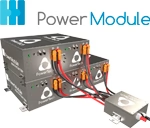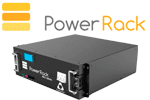Battery Management System (BMS) and BMS-Matrix® Technology

A BMS (Battery Management System) is essential in a Lithium-Ion battery system. This device manages a real-time control of each battery cell, communicates with external devices, manages SOC calculation, measures temperature and voltage, etc. (see key features on the right bar). The choice of BMS determines the quality and lifespan of the final battery pack.
Our BMS-Matrix® technology is a totally modular BMS solution, allowing you to build a very large capacity or power battery from unit “energy bricks”.
The configuration of a battery is done in a completely software-based way, whether for sizing, configuration but also operation and real-time monitoring.
All operating parameters can be configured according to the expected characteristics of the battery (peak power, average power, maximum DoD level, precharge of the system to be powered, and much more).
The deployment of a system using BMS-Matrix® technology is therefore very fast, and requires very little design (NRC) or prototyping costs before going into production. As certification is carried out at the level of the unit “energy bricks”, the final system benefits from the certification of the modules.
BMS-Matrix® can be embedded in medium power applications (e-mobility, off-grid and standalone applications, robotics & AGV, etc.).
BMS-Matrix technology is the fruit of many years of in-house R&D, supported by the European H2020 program as part of the MARBEL project.
For stationary batteries or high power traction batteries, BMS-Matrix® is a must-have technology.

Measurement :
- Cell and Pack voltage
- Cell and Pack temperature
- Current measurement by shunt and Hall effect sensor
Management :
- Hundreds for battery modules in series/parallel
- Cell Protection
- Thermal Management
- Balancing passive or active
- Redistribution (active balancing)
- Precharge system
- Life-Line for safety feature
Evaluation :
- Accurate State of Charge (SOC)
- Accurate State of Health (SOH)
- Depth of Discharge (DOD)
- Internal Resistance
- Residual Capacity
External Communication :
- Communication by CAN bus, CAN Open, WIFI, 4G.
- Charger Management using CAN Bus
- Cloud-based Data logging using API REST
- Cloud-based Remote monitoring














 France
France Europe
Europe Rest of the world
Rest of the world